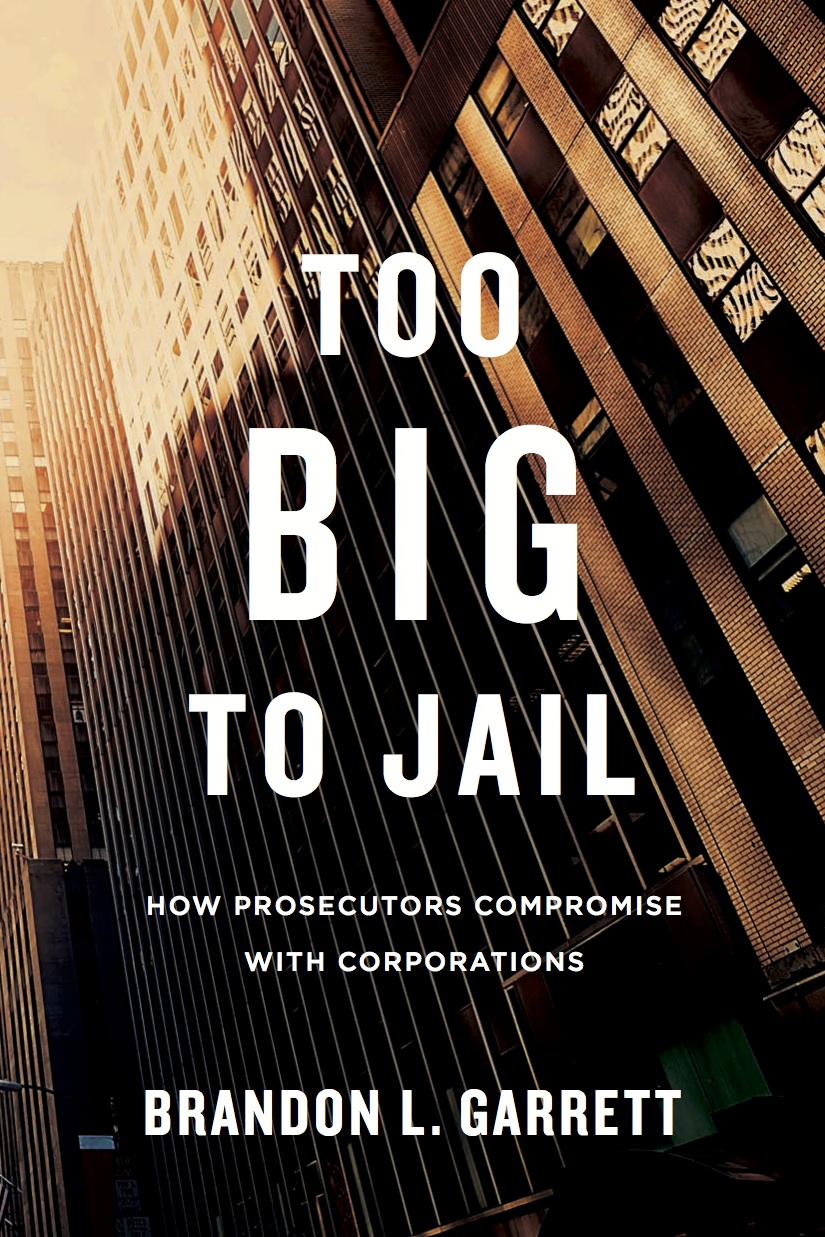University of Virginia law professor Brandon Garrett’s new book, “Too Big to Jail: How Prosecutors Compromise with Corporations,” to be released this month by Harvard University Press, examines the lenient backroom deals federal prosecutors are increasingly forging with big business.
“Prosecutors have had to compromise because of the pressure they face to resolve these cases and the enormous resources these companies have to defend themselves,” Garrett said. “What you see when you unpack these corporate prosecutions is genuinely troubling.”
Garrett, an expert in criminal law, is also the author of the book “Convicting the Innocent: Where Criminal Prosecutions Go Wrong,” an investigation of the cases of the first 250 people to be exonerated by DNA testing. Garrett’s work has been widely cited by courts, including the U.S. Supreme Court, lower federal courts, state supreme courts, and courts in other countries, such as the Supreme Court of Israel and the Supreme Court of Canada.
His new book’s title is a play on the notion that some corporations, such as large banks and financial institutions, are “too big to fail,” because a conviction might ruin their ability to do business, and in turn affect the economy. But Garrett said the Department of Justice has extended the “too big to jail” concept to businesses as diverse as pharmaceutical, health care, gas and extraction, and manufacturing corporations, too.
The deals, known as non-prosecution and deferred prosecution agreements, allow corporations to avoid conviction if they follow a plan of financial restitution and corrective action, often more lenient than would be mandated through the court system. At times, corporations have avoided fines completely.
“It’s the most privileged public companies, the largest companies, that have disproportionately received these lenient deals,” Garrett said.
He found that in two-thirds of the cases he researched, no corporate employees were prosecuted in association with their crimes.
“[Yet] the companies are admitting they absolutely committed the crimes, and in some cases they describe in great detail the employees who committed the crime,” Garrett said.
He also found that about a quarter of the time, there were no independent monitors supervising corporate compliance following a settlement.
In researching his book, Garrett compiled first-of-their-kind non-prosecution and deferred prosecution databases, with the help of School of Law research librarian Jon Ashley. Garrett supplemented his knowledge of the cases through personal interviews and other research, while working with the U.Va. Law’s First Amendment Clinic to request details of shielded settlements through the Freedom of Information Act – a process that continues.
With large corporations willing to spend hundreds of millions of dollars on lawyers to fight their charges, agreements that allow corporations to avoid a conviction may be the only way to achieve justice, Garrett said.
While the fines have been relatively lenient, it doesn’t mean they have been small.
“Billion-dollar fines have become the new normal,” Garrett said. “But those fines come from just a few blockbuster cases each year. Even when you look at those few cases, the fines are often much less than the company would have paid had the sentencing guidelines been applied.”
Foreign corporations, he added, are bearing the brunt in the trend toward larger settlements.
“I describe in the book how, disproportionately, the foreign companies tend to plead guilty – maybe because they are less concerned about the collateral consequences in the U.S., or maybe because they’ve committed worse crimes,” he said.
As deferred and non-prosecution agreements continue to be used, Garrett said, the public and the court could benefit from greater disclosure. In July, he asserted via an amicus brief to a federal judge that the court retains unqualified discretion to approve deferred prosecution agreements.
“They’re plea agreements by another name, without the consequences of conviction,” Garrett said. “The judge should have the power to bring the companies in for updates – status hearings – to make sure the company is really complying.”
In this book, Garrett proposes a number of ways that non-prosecution and deferred prosecution agreements could be improved, including by pursuing corporate convictions more often, enhancing supervision by judges, insisting on detailed structural reforms, imposing deterrent fines and increasing the transparency of corporate crime settlements.
Regardless of how the agreements change, he said, they need to evolve in order to serve as a more effective deterrent to future crime.
“Corporate prosecutions are themselves too important and too big to fail,” he said.
Media Contact
Article Information
October 13, 2014
/content/law-professor-s-book-takes-government-task-going-easy-corporations

